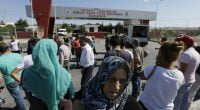News

Turkey as a “serial” human rights derogator
The past couple of months have been tumultuous in Turkey. In short order, an ill-conceived military coup was followed by popular mass protest, the quick return of President Recep Tayyip Erdogan to power, and a wave of repression ranging from military and judicial purges, to state restrictions on a panoply of basic human rights protections, to allegations of “widespread human rights abuses” by state actors.

Fear Grows in Turkey as Crackdown on Gulen Followers Continues
The Turkish authorities are continuing their crackdown on followers of Islamic cleric Fethullah Gulen, who is being blamed for a failed military coup attempt. With tens of thousands of people arrested, opposition parties are starting to voice concern that the crackdown is turning into a witch hunt.

Turkish school threatens students who refuse to write poems on coup attempt
The Education Ministry distributed “Attempt to invade Turkey with coup” brochures at all state schools across Turkey. Some 19 million students also watched a video of President Recep Tayyip Erdoğan reciting the Turkish national anthem along with footage from the night of July 15, when an abortive coup took place in Turkey.

Liberal Turkish Journalists Champion Freedom of Expression, to a Degree
It’s precisely opposition journalists who have been criticized by colleagues who until recently worked for the newspapers of U.S.-based Fethullah Gulen. These colleagues accuse the opposition journalists of betraying freedom of expression. One of them is Sevgi Akarcesme who was editor-in-chief of the Turkish English-language daily Today’s Zaman. There is a great deal of truth in Akarcesme’s claims. But who today would dare defend journalists identified with Gulen?

72-year-old Turkish man detained over coup charges
Gülen movement has been accused of masterminding the coup attempt on July 15 despite its successive statements that denied any involvement. Failing to back up its accusations with credible evidence, the government has detained more than 40,000 people and arrested 24,000 over their alleged links to the coup attempt since July 15.

Turkey could find itself facing hefty legal bill for mass purges
In 2006, the European Court of Human Rights (ECHR) ruled that Turkish citizen Osman Murat Ulke, who refused to perform compulsory military service as an act of civil disobedience, had been subjected to “civil death” due to the numerous prosecutions he faced after his original jail sentence. Ulke’s expulsion from his profession and the prospect of an interminable series of convictions, which forced him into hiding, constituted a “disproportionate” punishment, the court said.

Reporters Without Borders urges Turkey to rescind draconian state of emergency decrees
Two months after responding to a coup attempt by declaring a state of emergency, the Turkish government continues to target journalists, pluralism and freedom of information. RSF is today publishing a reportthat details the many abuses and urges the government to return to democratic principles.

European Parliament calls for fair trial of suspects arrested in anti-coup operations in Turkey
Members of the European Parliament (EP) discussed developments following the July 15 failed coup attempt in Turkey at a session on Tuesday and stressed the need for the fair trial of suspects who have been arrested on coup charges.

Erdogan at UN urges global action against preacher
Turkish President Recep Tayyip Erdogan on Tuesday demanded at UN speech international action against the US-exiled preacher Fethullah Gulen, whom he accuses of orchestrating an aborted coup d’etat against him. Gulen, who fled Turkey for Pennsylvania and has been active in religious dialogue and charity, strongly denies Erdogan’s charges that he organized the July military coup attempt, which quickly collapsed.

France sentences attacker targeting Gulenists as Turkey releases gunman in similar case
A 28-year-old man of Turkish origin has been handed down a prison sentence of eight months and a fine of 23,000 euros by a French court after he attacked several institutions affiliated with the faith-based Gülen movement in the country.

No country is safe for Gülen sympathizers, Erdoğan says
“No country, no region anywhere in the world, is a safe haven for FETÖ [an acronym the government has been using to refer to the Gülen movement] and militants,” said Erdoğan during a press conference at İstanbul Atatürk Airport, before flying to New York for the UN General Assembly.

Suspicious deaths, suicides become common occurrence in post-coup Turkey
The number of people who die in suspicious circumstances after being linked to the July 15 coup attempt has been rising with every passing day, a systematic occurrence that is casting a shadow over official statements pointing to suicide. At least 14 people have reportedly committed suicide. The relatives of most of them claim that the detainees are not the kind of people to commit suicide. Rumours also have it that some of the detainees were killed after being subjected to torture under custody.




















